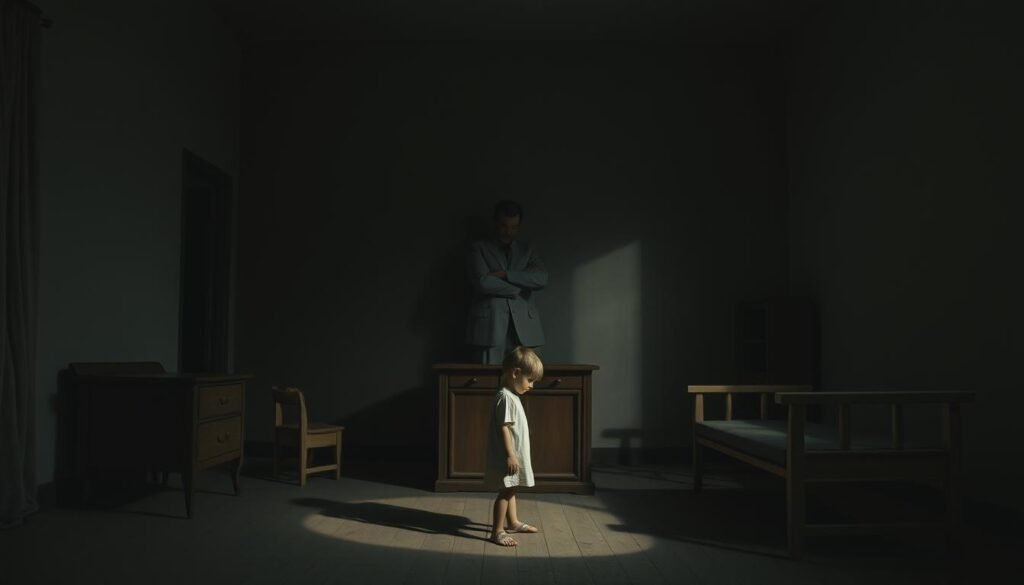Have you ever thought about the different parenting styles and how they affect your child? You can learn more about parenting styles by visiting parenting styles at https://americanspcc.org/the-4-types-of-parenting-styles/. Research shows that kids of authoritative mothers eat better and more fruits than others1. Knowing the different parenting styles is key to making good choices for your child.
In the 1960s, Diana Baumrind found three main parenting styles: authoritarian, authoritative, and permissive. A fourth style, neglectful, was added in the 1980s by Eleanor Maccoby and John Martin2. By learning about these styles, you can help your child grow into a confident and responsible person. Authoritative parenting is seen as the best because it balances warmth and flexibility2.
Key Takeaways
- There are four main parenting styles: authoritarian, authoritative, permissive, and neglectful.
- Each style has its unique characteristics and effects on child development.
- Understanding the different parenting styles is key to making informed decisions about your parenting approach.
- Authoritative parenting is considered the ideal style due to its combination of warmth and flexibility1.
- Learning about what are the different parenting styles and parenting styles comparison can help you make the best choices for your child.
- Positive parenting styles can help your child develop into a confident, responsible, and emotionally stable individual.
Understanding What Are the Different Parenting Styles
Exploring parenting styles can greatly affect your child’s growth. There are four main styles: authoritative, authoritarian, permissive, and uninvolved. Each style shapes a child’s behavior, self-esteem, and how they interact with others. Research shows that authoritative parenting is best, as it builds confidence, responsibility, and self-control in children3.
Parenting styles vary in demandingness and responsiveness. Authoritarian parents are strict but not responsive, which can harm a child’s self-esteem and emotional expression3. Permissive parents are lenient, which can confuse children about limits3. Uninvolved parents, or neglectful parents, can make children resilient but struggle with emotions and school4.
Understanding parenting styles is key to a child’s development. Authoritarian parenting can lead to bullying, while authoritative parenting boosts academic success3. Knowing these differences helps you choose the best parenting style for your child’s well-being.
- Approximately 30% of parents identify with authoritative parenting3
- Roughly 15% of parents adopt a permissive style, which can lead to behavioral issues in children3
- About 10% of parents are classified as authoritarian, which can lead to strained parent-child relationships and possible rebellion in teens3
The Authoritative Parenting Approach
Authoritative parenting is seen as the best parenting style. It strikes a balance between structure and freedom. This makes it a key part of modern parenting styles5. It involves setting clear rules and being very responsive to children’s needs.
This leads to kids who are more capable, happy, and successful6. Children raised this way tend to be more independent and self-reliant. They also tend to get along better with others5.
Some key traits of authoritative parenting include:
* High warmth and high control7
* Clear rules and expectations7
* Encouraging independence and open communication7
* Fair and consistent discipline7
This style is often seen as the ideal. It balances discipline, emotional control, and encourages independence. This makes it a great example of authoritative parenting6.
By using an authoritative parenting style, you can help your child grow. They will become more confident, self-reliant, and responsible. These traits are key for their future success. That’s why authoritative parenting is considered the best parenting style5.
| Parenting Style | Characteristics | Outcomes |
|---|---|---|
| Authoritative | High warmth, high control, clear expectations | Independent, self-reliant, socially accepted children5 |
| Authoritarian | High control, low warmth | Compliant, but potentially rebellious children5 |
| Permissive | Low control, high warmth | Dependent, entitled children5 |
Breaking Down Authoritarian Parenting

Exploring parenting styles and child development is key. Authoritarian parenting is high control, low connection. It often leads to negative effects8. Children may feel less confident and more anxious or aggressive9.
Research shows authoritarian parenting can cause teens to rebel against authority8.
Authoritarian parents use punishment and strict rules. This can make kids more aggressive and shy8. On the other hand, styles that focus on connection help build better relationships and social skills. It’s important to know the risks of authoritarian parenting and aim for a balanced approach.
Authoritarian parents often lack warmth and are very critical9. This can make kids overly dependent on rules and less independent10. Knowing the downsides of authoritarian parenting helps you choose a better way to raise your child.
Permissive Parenting: The Lenient Approach
Permissive parenting means parents have low expectations and are very responsive11. Many therapists and doctors don’t recommend it12. Kids raised this way might have trouble controlling themselves. They might struggle with social skills, making decisions, and solving problems11.
Some key traits of permissive parenting include:
- Parents don’t push for self-control or maturity
- They are very warm and responsive
- There are no clear boundaries or discipline
This style can lead to lower grades and more troublemaking1112.
But, permissive parenting can also help kids feel more confident and creative12. Finding the right balance between being warm and setting boundaries is key. Knowing the pros and cons of each parenting style is important13.
| Parenting Style | Characteristics | Outcomes |
|---|---|---|
| Permissive | Low demands, high responsiveness | Lower academic achievement, higher misconduct |
| Authoritative | High demands, high responsiveness | Higher self-esteem, better emotional regulation |
Uninvolved Parenting and Its Consequences

Uninvolved parenting, or neglectful parenting, means parents don’t get involved in their child’s life. This can harm a child’s development. Children may feel bad about themselves, struggle with their feelings, and find unhealthy ways to cope14.
Studies show kids with uninvolved parents often do poorly in school. They might drop out 20-30% more than kids with involved parents15. Also, they might feel low self-esteem or need too much from others because they didn’t get enough love and attention early on16.
Some signs of uninvolved parenting include:
- Parents not going to school events or meetings with teachers
- Children having trouble making friends outside the home
- Feeling emotionally distant from a young age
These signs can hurt a child’s emotional and mental health. It’s key for parents to know how their style affects their child14.
To change uninvolved parenting, parents need to put in effort. By being more involved, going to school events, and talking openly, parents can help their child. This can lead to better emotional health and overall well-being15. Parents should spot the signs of uninvolved parenting and work to create a caring environment for their child.
How Your Parenting Style Shapes Your Child’s Future
As a parent, your style greatly affects your child’s future. It impacts their school success, social skills, and emotional health17. Kids raised by authoritative parents often feel more confident and capable18. But, kids from other backgrounds might face more mental health problems17.
The best parenting style is a topic of much debate. Yet, research shows that authoritative parenting leads to the best results for kids. This includes better adjustment, performance, and mental health19. It’s vital to grasp how your parenting style affects your child’s growth. This knowledge helps you create a nurturing environment for your child to flourish.
Some key points to consider:
- Authoritative parenting is linked to higher levels of life satisfaction in children as they transition into adulthood17.
- Children raised by permissive parents are statistically more likely to engage in high-risk behaviors and tend to perform poorly in academic settings17.
- Uninvolved parenting can lead to lower self-esteem, emotional detachment, and difficulties with emotional regulation in children19.
Understanding your parenting style’s impact on your child’s future is key. It allows you to adjust your approach for their healthy development and well-being18. Remember, your parenting style is a critical factor in shaping your child’s future. Being aware of different parenting styles’ effects helps you make better choices19.
Finding Your Natural Parenting Style
As you explore parenting, finding a style that fits you and your child is key. Parenting styles comparison can feel daunting. Yet, knowing the different methods helps you make better choices. Authoritative parenting, for instance, is a positive parenting style. It encourages kids to be independent, self-reliant, and socially skilled20.
Research highlights the benefits of authoritative parenting. Kids raised this way often do better in school, feel more confident, and act well socially20. This approach also leads to fewer mental health problems compared to other styles21. To discover your natural parenting style, try self-assessment tools. They help you see your parenting strengths and areas for growth.
When crafting your parenting philosophy, keep these points in mind:
- Be quick and caring in meeting your child’s needs
- Offer a safe space for them to discover and learn
- Support their independence and self-reliance
By tailoring your parenting to your child’s needs, you create a supportive environment. This environment promotes healthy growth and strong relationships22.
Modern Challenges and Parenting Style Adaptations
Being a parent today comes with its own set of challenges. You have to deal with social media, technology, and changing social norms. Modern parenting styles need to change to meet your child’s needs and the demands of today’s world. About 70% of parents feel overwhelmed trying to balance work and family life, affecting their parenting23.
When it comes to parenting styles and child development, your approach matters a lot. For example, authoritative parenting helps children feel good about themselves, with 85% having strong self-esteem23. But, authoritarian parenting can lead to problems like anxiety and shyness in kids24.
To find the best parenting style for your child, think about these things:
- Communication: Talk openly and honestly with your child.
- Consistency: Have clear rules and consequences.
- Emotional support: Be there for your child emotionally.
By adjusting your parenting style to fit your child’s needs and today’s challenges, you can help them grow in a supportive environment.
There’s no single way to parent. Stay updated with research and trends to make informed choices. This way, you can support your child’s development the best way possible.
| Parenting Style | Characteristics | Effects on Child Development |
|---|---|---|
| Authoritative | Encourages independence, sets clear boundaries | High self-esteem, social responsibility, emotional control |
| Authoritarian | Strict, punitive, demanding | Externalizing and internalizing problems, anxiety, shyness |
| Permissive | Lenient, indulgent, lacking boundaries | Decreased social responsibility, increased antisocial behavior |
| Uninvolved | Distant, unresponsive, neglectful | Higher levels of child problem behavior, emotional detachment, insecurity |
Conclusion: Building Your Positive Parenting Journey
Starting your parenting journey means there’s no single way to do it right25. But, by using positive parenting styles, you can make a safe space for your child to grow26. Begin by setting clear rules and listening to your child’s needs. Use authoritative parenting to help your child become independent and self-controlled, which boosts their self-esteem and social skills27.
Looking at different parenting styles can give you ideas, but tailor your approach to your child’s personality and growth25. By using more positive words and talking openly, you can build a strong bond with your child26. Remember, every child is unique, so be ready to change your parenting style as they grow27.
Enjoy the ups and downs of parenting and trust your instincts to make your child’s life better25. With the right tools and a desire to learn, you can handle the changes in parenting and help your child succeed26.
FAQ
What are the different parenting styles?
How do parenting styles affect child development?
What are the key characteristics of authoritative parenting?
What are the long-term effects of authoritarian parenting?
How does permissive parenting affect a child’s development?
What are the signs of uninvolved parenting?
How can your parenting style shape your child’s future?
How can you find your natural parenting style?
How can parents adapt to modern parenting challenges?
Source Links
- The 4 types of parenting styles: What style is right for you? – Mayo Clinic Press – https://mcpress.mayoclinic.org/parenting/what-parenting-style-is-right-for-you/
- The Psychology Behind Different Types of Parenting Styles – https://jessup.edu/blog/academic-success/the-psychology-behind-different-types-of-parenting-styles/
- Pros and Cons of 4 Parenting Styles – https://wellspringprevention.org/blog/pros-cons-parenting-styles/
- Types of Parenting Styles and Effects on Children – StatPearls – https://www.ncbi.nlm.nih.gov/books/NBK568743/
- The authoritative parenting style: An evidence-based guide – https://parentingscience.com/authoritative-parenting-style/
- Do You Have an Authoritative Parenting Style? – https://www.verywellmind.com/what-is-authoritative-parenting-2794956
- An Authoritative Parenting Style: Balancing Love and Limits – https://upshurbren.com/an-authoritative-parenting-style-balancing-love-and-limits/
- Authoritarian parenting style – https://www.canr.msu.edu/news/authoritarian_parenting_style
- What Is Authoritarian Parenting? – https://www.webmd.com/parenting/authoritarian-parenting-what-is-it
- Authoritative vs authoritarian parenting styles – https://huckleberrycare.com/blog/authoritative-vs-authoritarian-parenting-styles
- Are You a Permissive Parent? – https://www.verywellmind.com/what-is-permissive-parenting-2794957
- Are You a Permissive Parent? What to Know About the Parenting Style – https://www.parents.com/parenting/better-parenting/style/permissive-parenting-the-pros-and-cons-according-to-a-child-psychologist/
- 4 Types of Parenting Styles | Bright Horizons – https://www.brighthorizons.com/resources/article/parenting-style-four-types-of-parenting
- How Does Uninvolved Parenting Affect a Child? – https://www.parents.com/uninvolved-parenting-style-8584432
- How Uninvolved Parenting Can Shape a Child’s Future – https://www.verywellmind.com/what-is-uninvolved-parenting-2794958
- Uninvolved Parenting: Pros and Cons, Effects, Examples, More – https://www.healthline.com/health/parenting/uninvolved-parenting
- How Different Styles of Parenting Impact Children – https://www.verywellmind.com/parenting-styles-2795072
- Parenting Styles for Child: How It Shapes Your Child’s Future – https://myfirst.tech/blog/parenting-styles-and-their-impact-on-child-development/
- 4 Types Of Parenting Styles – https://www.parentingforbrain.com/4-baumrind-parenting-styles/
- What Is Your Parenting Style, and Why Does It Matter? – https://www.parents.com/parenting/better-parenting/style/parenting-styles-explained/
- A psychologist shares the 4 styles of parenting—and the type that researchers say is the most successful – https://www.cnbc.com/2021/06/29/child-psychologist-explains-4-types-of-parenting-and-how-to-tell-which-is-right-for-you.html
- Natural Parenting Explained – https://babytula.com/blogs/babywearing/natural-parenting?srsltid=AfmBOoo-rL1JxczMGxJI5DdzZ7Q4m6LQ_WQvT8cWxEso68t4sLq__nih
- Parenting Styles: How They Shape Children’s Behavior and Future – https://www.linkedin.com/pulse/parenting-styles-how-shape-childrens-behavior-future-mansoor-gmbpss-wtkff
- Parenting Styles, Family Characteristics, and Teacher-Reported Behavioral Outcomes in Kindergarten – https://pmc.ncbi.nlm.nih.gov/articles/PMC9937526/
- Authoritative Parenting Style vs Permissive: Which is Better for Your Family? » Dr. Steven A. Lazarus, Psy.D., Inc. – https://drstevenlazarus.com/authoritative-parenting-style-vs-permissive-which-is-better-for-your-family/
- 4 Types of Parenting Styles & How Yours Makes a Difference – https://www.safes.so/blogs/4-types-of-parenting-styles/
- Parenting – Styles, Outcomes, Development | Britannica – https://www.britannica.com/topic/parenting/Parenting-styles-and-child-outcomes








0 responses to “Exploring the 4 Main Parenting Styles”